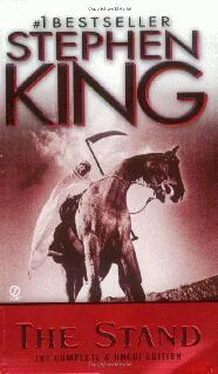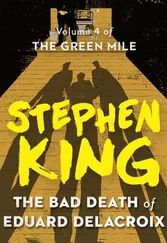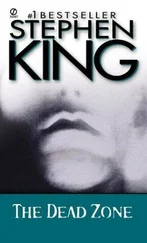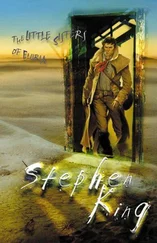“Now?” he asked, amused.
“No, on the radio.”
“That brown soun, she sho do get aroun,” Larry said, deepening his voice to Bill Withers level and smiling.
“Just like that,” she nodded. “When I was a girl, we thought Frank Sinatra was daring. Now they have this rap . Rap, they call it. Screaming , I call it.” She looked at him grudgingly. “At least there’s no screaming on your record.”
“I get a royalty,” he said. “A certain percent of every record sold. It breaks down to—”
“Oh, go on,” she said, and made a shooing gesture with her hand. “I flunked all my maths. Have they paid you yet, or did you get that little car on credit?”
“They haven’t paid me much,” he said, skating up to the edge of the lie but not quite over it. “I made a down payment on the car. I’m financing the rest.”
“Easy credit terms,” she said balefully. “That’s how your father ended up bankrupt. The doctor said he died of a heart attack, but it wasn’t that. It was a broken heart. Your dad went to his grave on easy credit terms.”
This was an old rap, and Larry just let it flow over him, nodding at the right places. His father had owned a haberdashery. A Robert Hall had opened not far away, and a year later his business had failed. He had turned to food for solace, putting on 110 pounds in three years. He had dropped dead in the corner luncheonette when Larry was nine, a half-finished meatball sandwich on his plate in front of him. At the wake, when her sister tried to comfort a woman who looked absolutely without need of comfort, Alice Underwood said it could have been worse. It could, she said, looking past her sister’s shoulder and directly at her brother-in-law, have been drink.
Alice brought Larry the rest of the way up on her own, dominating his life with her proverbs and prejudices until he left home. Her last remark to him as he and Rudy Schwartz drove off in Rudy’s old Ford was that they had poorhouses in California, too. Yessir, that’s my mamma.
“Do you want to stay here, Larry?” she asked softly.
Startled, he countered, “Do you mind?”
“There’s room. The rollaway’s still in the back bedroom. I’ve been storing things back there, but you could move some of the boxes around.”
“All right,” he said slowly. “If you’re sure you don’t mind. I’m only in for a couple of weeks. I thought I’d look up some of the old guys. Mark… Galen… David… Chris… those guys.”
She got up, went to the window, and tugged it up.
“You’re welcome to stay as long as you like, Larry. I’m not so good at expressing myself, maybe, but I’m glad to see you. We didn’t say goodbye very well. There were harsh words.” She showed him her face, still harsh, but also full of a terrible, reluctant love. “For my part, I regret them. I only said them because I love you. I never knew how to say that just right, so I said it in other ways.”
“That’s all right,” he said, looking down at the table. The flush was back. He could feel it. “Listen, I’ll chip in for stuff.”
“You can if you want. If you don’t want to, you don’t have to. I’m working. Thousands aren’t. You’re still my son.”
He thought of the stiffening cat, half in and half out of the trash can, and of Dewey the Deck, smilingly filling the hospitality bowls, and he suddenly burst into tears. As his hands blurred double in the wash of them, he thought that this should be her bit, not his—nothing had gone the way he thought it would, nothing. She had changed after all. So had he, but not as he had suspected. An unnatural reversal had occurred; she had gotten bigger and he had somehow gotten smaller. He had not come home to her because he had to go somewhere. He had come home because he was afraid and he wanted his mother.
She stood by the open window, watching him. The white curtains fluttered in on the damp breeze, obscuring her face, not hiding it entirely but making it seem ghostly. Traffic sounds came in through the window. She took the handkerchief from the bodice of her dress and walked over to the table and put it in one of his groping hands. There was something hard in Larry. She could have taxed him with it, but to what end? His father had been a softie, and in her heart of hearts she knew it was that which had really sent him to the grave; Max Underwood had been done in more by lending credit than taking it. So when it came to that hard streak? Who did Larry have to thank? Or blame?
His tears couldn’t change that stony outcropping in his character any more than a single summer cloudburst can change the shape of rock. There were good uses for such hardness—she knew that, had known it as a woman raising a boy on her own in a city that cared little for mothers and less for their children—but Larry hadn’t found any yet. He was just what she had said he was: the same old Larry. He would go along, not thinking, getting people—including himself—into jams, and when the jams got bad enough, he would call upon that hard streak to extricate himself. As for the others? He would leave them to sink or swim on their own. Rock was tough, and there was toughness in his character, but he still used it destructively. She could see it in his eyes, read it in every line of his posture… even in the way he bobbed his cancer-stick to make those little rings in the air. He had never sharpened that hard piece of him into a blade to cut people with, and that was something, but when he needed it, he was still calling on it as a child did—as a bludgeon to beat his way out of traps he had dug for himself. Once, she had told herself Larry would change. She had; he would .
But this was no boy in front of her; this was a grown-up man, and she feared that his days of change—the deep and fundamental sort her minister called a change of soul rather than one of heart—were behind him. There was something in Larry that gave you the bitter zing of hearing chalk screech on a blackboard. Deep inside, looking out, was only Larry. He was the only one allowed inside his heart. But she loved him.
She also thought there was good in Larry, great good. It was there, but this late on it would take nothing short of a catastrophe to bring it out. There was no catastrophe here; only her weeping son.
“You’re tired,” she said. “Clean up. I’ll move the boxes, then you can sleep. I guess I’ll go in today after all.”
She went down the short hall to the back room, his old bedroom, and Larry heard her grunting and moving boxes. He wiped his eyes slowly. The sound of traffic came in the window. He tried to remember the last time he had cried in front of his mother. He thought of the dead cat. She was right. He was tired. He had never been so tired. He went to bed and slept for nearly eighteen hours.
It was late afternoon when Frannie went out back to where her father was patiently weeding the peas and beans. She had been a late child and he was in his sixties now, his white hair coming out from under the baseball cap he always wore. Her mother was in Portland, shopping for white gloves. Fran’s best childhood friend, Amy Lauder, was getting married early next month.
She looked down at her dad’s back for a peaceful moment, just loving him. At this time of day the light took on a special quality that she loved, a timeless quality that belonged only to that most fleeting Maine genus, early summer. She could think of that particular tone of light in the middle of January and—it would make her heart ache fiercely. The light of an early summer afternoon as it slipped toward dark had so many good things wrapped up in it: baseball at the Little League park, where Fred had always played third and batted clean-up; watermelon; first corn; iced tea in chilled glasses; childhood.
Читать дальше












